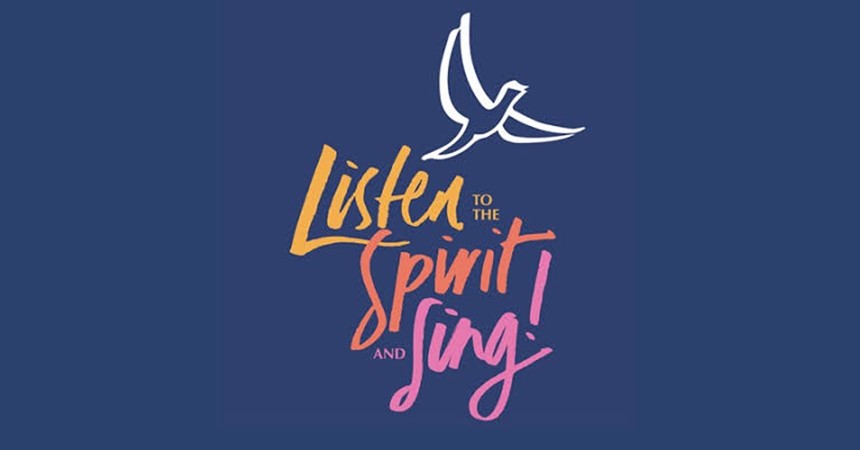The title, Listen to the Spirit and Sing, not only reflected the impetus of the Plenary Council but also captured the essence of prayer and liturgy as a response to the experience of God’s presence in our lives. We first listen!
Tony Alonso and Diana Macalintal were the keynote speakers.
I knew some of Tony’s music, mainly because Anne Millard (Director of Cathedral Music) is a member of his fan club. However, what I discovered is that his music emerges not only from deep faith but also from a rich and fresh theology. He gave two keynote presentations:
Listen to this! A not so universal language
In this presentation, Tony challenged the popular adage that ‘music is a universal language’. The laughter in the hall as he reflected on some of his own experiences of how divisive our musical choices can be, indicated that this is a common experience. He then proceeded to unpack three insights that might assist us to take a more pastoral approach to the discernment of music for prayer and liturgy.
- Using recent studies in neuroscience, he outlined how our musical preferences are formed from our earliest years. This, along with differences in ages, culture, gender etc, is what forms the diverse musical preference in our communities. Tony presented this diversity as a call for: conversation rather than division; music ministers to be aware of their own personal preferences; awareness of the music gaps in our community repertoire.
- The need to recognise the important role music plays in forming our deep memories, both as individuals and communities. We know from personal experience that music and words are planted deep in our hearts long after they are heard and sung. Tony asked, ‘What communal memory is being written on us by what we sing and don’t sing in liturgy?’ As almost a proof of what he was saying, the following two lines have been echoing in my mind and heart since the conference, ‘From the many make us one’ and ‘And God saw that it was good’! Both are songs of Tony.
- He spoke passionately about the connection between music and emotion, recalling the story of Anne Lamott told in ‘Travelling Mercies’ Again we know from experience that music makes us feel something. Here again we need to be sensitive to our differences. A piece of music is not going to evoke the same emotion in everyone.
Overall, Tony identified the truth that the Spirit of God will not be bound and is calling us to a different way of listening that promotes reconciliation and wholeness.
Becoming what we sing: Liturgical reflections from the heart of Pope Francis
This was a very thought provoking and moving address. The stillness in the hall indicated the depth of engagement as Tony explored the relationship between liturgy, belief and life. Church is not an escape from the world and so this relationship must be porous, especially the relationship between eucharist and life. Reflecting on Pope Francis he noted the need for us to live:
- a eucharistic vision that subverts division and unites every difference, leading us to see according to the vision of Jesus and God’s kingdom. We pray… ‘Open my eyes Lord’;
- eucharistic mercy that calls us to forgive because we remember; to a mercy so deep it leads us to the cross. The liturgy teaches us the vocabulary of mercy;
- eucharistic mission calls us to live eucharistically; to fully, consciously and actively participate in the kingdom work that is yet to be done. We are the people formed in the eucharist to look for life where others tell us there is only death.
Diana Macalintal is one passionate woman. Her keynote address was titled: Liturgical participation: How we learn the true Christian Spirit.
Diana took us on a journey into a much deeper appreciation of ‘liturgical participation’ than just showing up and doing a ministry. To learn the true Christian spirit we must be open to conversion. Echoing some of our Church leaders through the ages she asked, ‘What good is it if only the bread and wine change?’ The ultimate point is that we are changed. And we will only be changed through encounter with Christ which means we need to do more than show up and ‘do’ a ministry. In the liturgy we are invited to participate in: the ritual action, Christ’s action and ultimately the life of the Trinity. In the liturgy we participate in the work of Christ and the life of God so we become more and more truly the presence of God in the world, living eucharistically.
In addition to the Keynotes there was the opportunity to participate in six workshops from a choice of thirty-two. There were also two plenary sessions. One a listening and dialogue session with a panel of young adults, the other a workshop presented by both Diana and Tony entitled Becoming leaders of sung prayer.

 The conference was enriched by the diversity of participants. People came from across Australia and some from ‘across the ditch’. There was a great mix of ages with many young people participating. There was also a wide range of ministries and experience amongst the participants.
The conference was enriched by the diversity of participants. People came from across Australia and some from ‘across the ditch’. There was a great mix of ages with many young people participating. There was also a wide range of ministries and experience amongst the participants.
A highlight for us was the launch of Anne Millard’s recently published Simply Singable Psalms. Congratulations Anne. Anne and Cath Mahony also presented two workshops.
I bought some music books for the Liturgy Office, which anyone is welcome to come and have a look at. There is more information about each one if you click on the links below.
- Simply Singable Psalms by Anne, published by Liturgical Song.
- Revival and Revival II by Tony Alonso, published by GIA. This is an interesting project. Like some other composers, Tony is reviving some of our Catholic classics with a more contemporary accompaniment, which broadens their appeal.
- The Lyric Psalter by Tony Alonso and Marty Haugen, published by GIA. There are four books – psalms for years A, B, C and Solemnities, Feasts and other occasions. This collection is true to the translation and set to a more lyrical melody for those who find chant not so appealing.
All of us who love to listen to our Richard Lennan know that one of his constant themes is that Catholic means ‘both/and’ NOT ‘either/or’. If I were to gather the whole experience of Listen to the Spirit and Sing into one key insight, I would say this: like good liturgy, good worship music must be both true to our Catholic nature AND pastorally sensitive and flexible. Overall the conference presented much food for thought that will help us to continue to discern this ‘both/and’ path here in our Church of Maitland-Newcastle. Music is critical because as the title of Tony Alonso’s final keynote address, it is about ‘Becoming what we sing’. It must be about this because the liturgy it serves is about us becoming what we pray… The Body of Christ.
So with that in mind, you might consider, ‘What are you singing in your community?’ Ponder this and watch out. There will be more about this as the months unfold. Listen to the Spirit… and sing.
Reminder: Diana will be here on Saturday (Oct 19) with her husband Nick Wagner for our RCIA Workshop. It is not too late to register! Contact Sharon.

